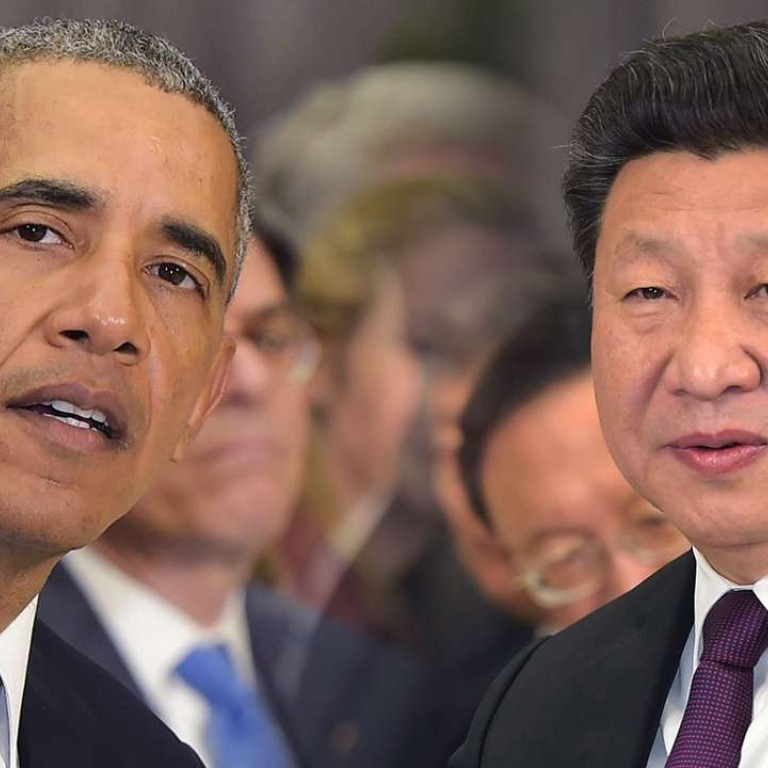
Xi and Obama: what happened when two of the most powerful men in the world got together
What did Xi Jinping want from Barack Obama? What did they agree or disagree on? We give you key takeaways from the two leaders’ meeting in Washington
China’s President Xi Jinping on Thursday urged his US counterpart Barack Obama to cast aside confrontation and to cooperate to manage the differences between the two powers.
The two leaders were meeting ahead of a global nuclear security summit in Washington to discuss a long list of issues that have strained ties between China and the United States in recent months.
Xi and Obama agreed that they remained committed to the denuclearisation of the Korean Peninsula.
They agreed to pass new stringent UN sanctions to punish North Korea for its recent nuclear and rocket tests and to press it to give up its nuclear weapons programme.
The two leaders reached partial agreement on issues including military exchanges and cybersecurity, and issued joint statements on nuclear security cooperation and climate change.
They remained at odds, however, over the contested South China Sea as well as US plans to deploy an advanced missile defence system in the Korean Peninsula.
Here is a summary of what was discussed:
Xi and Obama found common ground in...
Climate change: The two leaders issued their third joint statement on climate change, saying that China and the US would sign the Paris Agreement on April 22 and take domestic steps to join the Agreement as soon as possible this year.
Watch: US, China to be among climate deal signatories
Nuclear security: In another joint statement, Xi and Obama said they successfully completed bilateral discussions on nuclear security in Stockholm, Sweden, last month and would continue to work together in converting reactors, providing nuclear security training, countering nuclear smuggling and ensuring the security of radioactive sources.
Military exchange: China and the US will carry out planned exchanges and institutional consultations, and continue building mutual trust through such exchanges.
Cybersecurity: The two powers will implement agreements from December’s high-level dialogue to counter internet crimes and make cybersecurity a highlight in Sino-US cooperation.
Iran: The two sides, having worked closely together on the Iranian nuclear deal, have concluded and implemented the Joint Comprehensive Plan of Action to roll back Iran’s nuclear programme.
Syria, Afghanistan, peacekeeping work, health and other issues: China and US also engaged in effective communication and coordination over these issues, the presidents said.
What does China want from the US?
G20 summit: Bejing wants the US to support the G20 Summit China will be hosting in Hangzhou, Zhejiang province, in September to make it a success.
Taiwan: Xi urged the US to stick to the “One China” policy and take concrete action to safeguard peaceful cross-strait relationship between mainland China and Taiwan, given that the island has elected a pro-independence president.
Bilateral Investment Treaty: Xi wants China and the US to agree on a mutually beneficial treaty as soon as possible.
Currency and the economy: Xi opposed competitive currency devaluation to stimulate exports, saying that China and the US should strengthen coordination in macroeconomic policies, given weak global growth and turmoil in the financial markets.
Xi and Obama could only agree to disagree on...
South China Sea: Xi warned that China would not accept violations of its sovereignty in the name of freedom of navigation – a reference to air and naval patrols Washington has sent within areas that Beijing considers its territorial waters.
THAAD missile system: Xi stressed that all parties in the Korean nuclear issue must never take any action that would affect other countries’ security interests and regional strategic balance. China has been stressing this point since the US revealed plans to deploy a Terminal High-Altitude Area Defence (THAAD) missile system in the Korean peninsula. The system’s radar has a range that extends far beyond the peninsula into China

